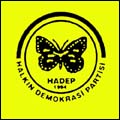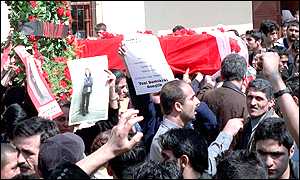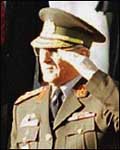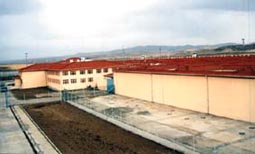9
January 2002
![]()
1. "Court to hear Kurdish party's defense in late January", Turkey's constitutional court will hear on January 30 the defense of the country's main pro-Kurdish party in a drawn-out trial seeking the party's closure, in a case closely watched by the European Union.
2. "Turkish hunger strike toll hits 45, president pardons fourth inmate", the death toll in a long-standing hunger strike against controversial jail reforms in Turkey has reached 45 with the death of a woman prisoner here, a leading human rights group told AFP on Tuesday.
3. "Turkey's top general calls for strong measures against corruption", Turkey's top general called Tuesday for strong measures to combat corruption, widely seen as a central cause of an economic crisis including massive bankruptcies and layoffs.
4. "Repression on captives", PKK captives in prisons all around Turkey, stating that repression their national, political and cultural identity had recently increased, called on the public to be sensitive.
5. "EUROPE: Turkey's reforms aim to win Dollars 16bn IMF loan", the Turkish parliament adopted a law reducing scope for corruption in public procurement late on Friday in the country's latest effort to win a Dollars 16.3bn (Euros 18.3bn, Pounds 11.3bn) loan from the International Monetary Fund.
6. "Empire of the Ottomans", the Ottoman empire dates from the late 13th century until 1922, when it was replaced by the Turkish Republic and various successor states in south-eastern Europe and the Middle East.
1. - AFP - "Court to hear Kurdish party's defense in late January":
ANKARA
Turkey's constitutional court will hear on January 30 the defense
of the country's main pro-Kurdish party in a drawn-out trial seeking
the party's closure, in a case closely watched by the European Union.
The People's Democracy Party (HADEP) risks being banned on charges of maintining links with armed rebels in the outlawed Kurdistan Workers' Party (PKK), which has fought a 15-year armed campaign Kurdish self-rule in Turkey's southeast. The court has also decided to listen to the arguments of the prosecution on January 17, the deputy head of court Hasim Kilic told reporters on Wednesday.
The court began sitting in January 1999 but has dragged its feet on the case. Earlier this month, Turkey's chief prosecutor sent a harshly worded written appeal to the court to speed up procedures. Banning HADEP, which denies the charges, will almost certainly strain ties between Ankara, a candidate for EU membership, and the European Union, which has criticized Turkey's troubled human rights record and democracy.
The party says it favors a peaceful resolution to the
Kurdish conflict, which has claimed about 36,500 lives since 1984 when
the PKK launched its armed campaign against Ankara. The constitutional
court has outlawed 23 parties, among them pro-Islamic, Communist and
pro-Kurdish parties, in the past four decades. ![]()
2. - AFP - "Turkish hunger strike toll hits 45, president pardons fourth inmate":
ISTANBUL
The death toll in a long-standing hunger strike against controversial
jail reforms in Turkey has reached 45 with the death of a woman prisoner
here, a leading human rights group told AFP on Tuesday. Lale Colak,
26, died late on Monday in an Istanbul hospital, where she was taken
in December after a fast lasting 222 days, the Human Rights Association
(IHD) said.
Colak, jailed for membership of a far-left underground group, was given a six-month conditional release from prison on December 21 because of her failing health. She was admitted to hospital the same day. In Ankara, meanwhile, a brief statement from the presidential palace said President Ahmet Necdet Sezer had pardoned an inmate, Ramazan Cicek, due to his deteriorating health.
Cicek was part of the hunger strike and was granted a six-month conditional release in October as his health failed, the IHD told AFP. He bacame the fourth hunger striker to be pardoned by Sezer since December. Under the Turkish constitution, the president may pardon prisoners if they are deemed to be suffering a "lasting illness." The death toll from the hunger strike, which was initiated in October 2000 by mainly far-left inmates, involves both prisoners and outside supporters of the movement.
Four inmates have burned themselves to death in support
of the strike and another four people died last November in a police
raid on an Istanbul house occupied by hunger-strikers. The protestors
say the new prisons, where cells for one to three people have replaced
large dormitories housing dozens of inmates, leave prisoners in social
isolation and make them more vulnerable to maltreatment. The government,
however, has categorically ruled out a return to the dormitory system,
arguing that the packed compounds had become strongholds for criminal
groups, which frequently rioted and took prison officials hostage. ![]()
3. - CNN - "Turkey's top general calls for strong measures against corruption":
ISTANBUL
Turkey's top general called Tuesday for strong measures to combat
corruption, widely seen as a central cause of an economic crisis including
massive bankruptcies and layoffs.
"We must dig down to the roots of corruption," Gen. Huseyin Kivrikoglu, the chief of Turkey's general staff, told journalists at a ceremony to open a new military research center. "Otherwise, it will be hard for Turkey to stay on its feet."
His comments came as Turkey appears to be on the verge of recovery after a yearlong economic crisis which has seen the currency lose around half its dollar value, while at least a million Turks lost their jobs.
Many Turks believe that corruption was a key cause of the crisis, especially in the banking system. Politicians are accused of running up massive losses at state banks by funneling loans to key political constituents, while several private banks have collapsed.
The government is currently preparing a controversial new law which aims to stabilize the banking system by injecting capital into larger private banks. Critics say the move will effectively mean taxpayers are paying for the bank's misdoings.
Asked about the planned measure, Kivrikoglu said the army had no opinion but wanted "whatever is best for Turkey."
Turkey's army has a strong influence over many areas of
domestic politics, but seldom enters disputes over economic policy.
![]()
4. - Kurdish Observer - "Repression on captives":
PKK captives in prisons all around Turkey, stating
that repression their national, political and cultural identity had
recently increased, called on the public to be sensitive. 
Detainees and convicts from PKK cases drew attention that repression
on their national, political and cultural identity had recently increased,
asking for sensitivity and attempt. A common statement by all PKK detainees
and convicts in prisons in Kurdistan and Turkey stressed that anti-democratic
and arbitrary treatment had been continuing especially after December
19 massacre in prisons. The statement noted that in spite of death fast
actions where more than 80 captives had lost their lives, there were
no improvement in the prison conditions. The PKK captives continued
to say the following: "They assault on the most natural and legitimate
demands of our people for identity, language and culture. Recently a
systematic repression on our national, political and cultural identity
has increased."
Repressions one right after the other
The statement listed unlawful acts by prison administrations ordered by Justice Ministry as follows:
- As a statement of aggressiveness against the Kurdish culture, language and music, our Kurdish music bands and tapes are confiscated and legal publications in Kurdish are prevented from entering into prisons.
- The state, constructing new prisons costed millions of dollars in spite of the economic crisis, have not allocated any budget for our health problems. There are no doctors in a number of prisons. Our friends who have chronic illnesses are not treated. Our comrades Yahya Perisan and Sefik Akkol have recently lost their lives due to lack of treatment.
- The February circular forces the captives to pay for their electricity and water consumption.
- Repression on defence lawyers and visitors is on rise. Visiting time are limited, our relatives are searched from head and toe and harassed, they are threatened and in some cases detained. The circular gives the opportunity to obstruct the meetings of lawyers with their clients and to confiscate documents related with cases.
The statement concluded with words to the effect: "We call on our people, democratic organisations and international human rights defenders to be sensitive against provocative, arbitrary and unlawful acts in prisons, and take action."
He is not treated
Cuma Orhan, 52-year-old prisoner from PKK case in Ceyhan Prison who has cancer, is not treated on the grounds that he is not "on the threshold of death". Attempts of his family in Mersin proved to be fruitless. Applying to the President of the Republic for release of his husband, Serife Orhan was answered "Your husband's condition was discussed according to the article 104 of the Constitution. He should apply to the Public Prosecutor's Office." Then Serife Orhan applied to Ceyhan Public Prosecutor. Upon the application Cuma Orhan was moved to Adana Numune Hospital but was turned down on the grounds that he was not "on the threshold of death". Wife Orhan reacted saying that "Will he be released after he dies? He cannot stand up. His lower body is paralysed. Is a person who is in deathbed treated?"
Sefika Orhan applied to the Presidency and Justice Ministry
again. ![]()
5. - The Financial Times - "EUROPE: Turkey's reforms aim to win Dollars 16bn IMF loan":
By LEYLA BOULTON
The Turkish parliament adopted a law reducing scope for corruption
in public procurement late on Friday in the country's latest effort
to win a Dollars 16.3bn (Euros 18.3bn, Pounds 11.3bn) loan from the
International Monetary Fund.
The law, which introduces a more efficient and transparent procurement system in January 2003, is one of a handful of structural reforms that are preconditions for the IMF's board to approve a three-year standby agreement for Turkey.
The government has undertaken to adopt "prior actions" agreed with the IMF by mid-January, when Bulent Ecevit, prime minister, visits Washington. At an IMF board meeting expected in the second half of January, the US is expected to use its influence to secure fresh IMF loans that would make Turkey, a vital US ally which has also met all its IMF-agreed fiscal targets, the fund's biggest borrower.
Under the loans-for-reform programme, Turkey, which suffered an 8.5 per cent economic contraction last year, aims to achieve 3 per cent growth next year. With the help of a system of inflation targeting to be introduced later this year, Ankara also seeks to reduce inflation to 12 per cent by the end of 2004 from 88.6 per cent and 68.5 per cent on a wholesale and consumer price basis respectively last year.
Late on Thursday, parliament passed a tobacco law that would slash subsidies to Turkish tobacco farmers and pave the way for the privatisation of Tekel, the state-owned tobacco and alcohol monopoly.
A third legislative step promised to the IMF is the adoption of a banking law that has become snarled up in controversy over provisions to lend state funds to banks which cannot on their own achieve a statutory capital adequacy ratio of 8 per cent.
Engin Akcakoca, president of the Banking Regulation and Supervision Agency, said on Friday that the plan would involve lending Dollars 4bn in government funds to the banking system. To qualify for such help, banks would have to represent more than 1 per cent of total Turkish banking assets and match funds provided by the state.
Western officials say the plan aims to remove doubts about
the soundness of the banking system, which has triggered two financial
crises in just over a year. ![]()
6. - BBC - "Empire of the Ottomans":

The Ottoman empire dates from the late 13th century until 1922, when
it was replaced by the Turkish Republic and various successor states
in south-eastern Europe and the Middle East.
The centre of the empire was in what is now Turkey and the Balkans, but after periods of continuous expansion, its reach extended from present-day Hungary and the Ukraine to most of the Middle East and North Africa.
It was created by Turkish tribes in the small north-western Anatolian principality. In their initial stages of expansion, the Ottomans were leaders of the Turkish warriors for Islam who fought against the shrinking Christian Byzantine state.
The empire became one of the most powerful in the world in the 15th and 16th centuries. It was ruled by sultans, who were simultaneously political leaders and supreme rulers of the Muslim world.
Peak of grandeur
The golden age of Ottoman history was overseen by Sultan Suleyman I the Magnificent (1520-66). Under his rule, the Ottomans achieved the height of their military victories and artistic endeavours.
Important conquests during this period extended the empire's domain well into central Europe and throughout the Arab portion of the old Islamic caliphate.
The conquest of the Arab world brought with it abundant wealth and power.
The empire shrivelled in the late 19th and 20th century, a slow but steady decline that began under Suleyman.
He is said to have tired of continuous military campaigns and the duties of administration and withdrew to the pleasures of his harem.
The empire's decline is said to have been brought about by a lack of ability and power of the sultans. As a result, central government became weak, and control of most of the provinces was lost to the local ruling notables.
In Turkey, the sultans were replaced by general Kamal Ataturk, a determined secularist who founded the Turkish republic.
Today, there are remains of Ottoman castles dotted throughout
the former empire, particularly the Middle East. Many of these magnificent
fortresses were erected for the accommodation and security of pilgrims.
![]()